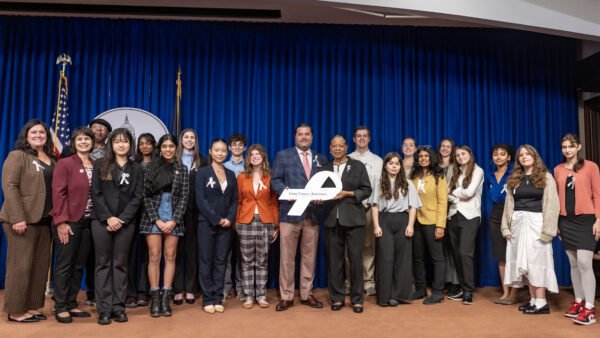
Senator joins advocates and community leaders to introduce legislation requiring radon testing in Pennsylvania schools.
HARRISBURG – Sen. Devlin Robinson (R-37) stood alongside advocates and community leaders at a legislative briefing at the state Capitol, hosted by the Radon in Schools Working Group, where he unveiled his new bill aimed at combating radon exposure in Pennsylvania schools. The legislation would address a pressing public health concern that has long gone unaddressed in the commonwealth.
Radon, a naturally occurring radioactive gas, poses serious health risks, particularly in Pennsylvania, where the state’s unique geology increases the likelihood of elevated radon levels. Despite these risks, many schools across the state fail to perform regular radon testing. A national survey revealed that nearly one in five schools has at least one classroom with radon levels exceeding the Environmental Protection Agency’s (EPA) action threshold of 4 picocuries per liter – the level at which remediation is strongly advised.
“As parents, teachers and community leaders, it is our duty to ensure the environments in which our children learn and grow are safe,” said Robinson. “That’s why I am introducing legislation to require all Pennsylvania schools to test for radon at least once every five years and to take swift action if elevated levels are detected. Schools that test at or above the EPA’s action level will be required to implement mitigation strategies to reduce radon levels and protect the health of students and staff.”
Senate Bill 1328, a bipartisan bill introduced by Robinson, also includes provisions that would require radon testing within 19 months of the completion of any new or remodeled school building. This proactive measure would help prevent potential exposure from the outset, reinforcing the importance of radon safety as a critical element of long-term educational infrastructure planning.
“Radon testing is not a complex process – it’s simple, effective and it saves lives,” Robinson continued. “We have the tools and knowledge to protect our children from this invisible threat. No school in Pennsylvania should go untested.”
Radon is the leading cause of lung cancer among non-smokers, and the risk is particularly severe for children. Developing lungs are more susceptible to the long-term damage caused by radon exposure, which can lead to permanent lung damage or even other cancers, such as leukemia.
Community leaders and public health advocates expressed strong support for Robinson’s legislation.
“Radon exposure in schools is a significant public health concern,” said Michelle Naccarati-Chapkis, executive director of Women for a Healthy Environment. “But through routine testing and mitigation, we can prevent this environmental harm. Protecting the health of children and school personnel, many of whom spend decades in these buildings, should be a top priority. We applaud Sen. Robinson’s leadership in addressing this urgent issue.”
“All Pennsylvania public schools should be tested for elevated levels of radon gas, a radioactive pollutant that can seep into school buildings and put our children and teachers at risk for lung cancer and other serious diseases,” added Nate Burden, president of the PA Indoor Environments Association.
Robinson emphasized the broader significance of the legislation. “This bill is not just about compliance – it’s about prevention. It’s about ensuring that the air our children breathe is safe. Together, we can take a meaningful step toward creating healthier, safer schools where our students can learn and thrive.”
The event also included expert insights on radon’s health impacts, guidance on mitigation strategies for schools and perspectives from 17 student leaders on the importance of ensuring safe learning environments.
“We must take the first step toward addressing the lack of radon testing by supporting this Radon in Schools bill,” said North Allegheny High School student Yuki Qian. “We can address environmental injustices in this way, but communication, empathy and understanding between all community members is necessary. I know that we as young people are the best at building these connections, so we hope our youth voice will bring new perspectives on how we can work together within our communities.”
To watch the full event, click here.
CONTACT: Allison Dutrey


